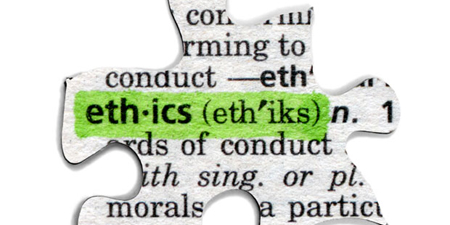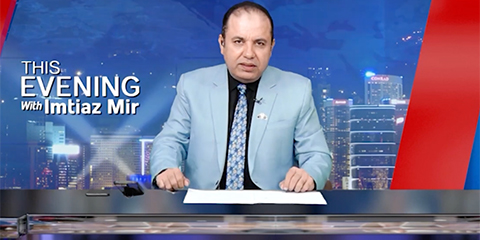
PFUJ calls for end to Impunity for Crimes Against Journalists
November 02, 2025: PFUJ urges Pakistan’s federal and provincial governments to end Impunity for Crimes Against Journalists and ensure their safety and press freedom.
JournalismPakistan.com | Published 8 years ago
Join our WhatsApp channel
ISLAMABAD - A national code of conduct for journalism inspired by a local ethical journalism group affiliated to the Ethical Journalism Network and agreed by journalists across the country was launched in Islamabad this week.
The code, which aims to unify journalists working across all platforms of media, emerged after a two-year consultation process involving almost 1,500 journalists, editors and media leaders and discussions with media stakeholders at 51 meetings around the country.
“This code is a breakthrough for journalists in Pakistan, but it is a model that will inspire reporters and editors everywhere,” said Aidan White, EJN Director, in his address via Skype to the National Symposium at the International Islamic University where the code was launched on Friday.
“All journalists, wherever they work, now have a single, unified statement of ethics and values,” he said. “This will strengthen journalism and give fresh momentum to the campaign to protect press freedom and to inspire responsible communications across the information landscape in Pakistan.”
The code identifies six key elements of ethical journalism – truth and accuracy; pluralism; independence, fairness and impartiality; confidentiality and privacy; accountability and good governance; and, finally, humanity and the duty to do no harm – and also makes a number of recommendations under each theme to help media put the code into practice.
White said the next steps would be to prepare detailed guidelines for journalists working across different platforms to help them create an editorial working environment that will make the code effective.
The initiative to develop the code was taken by the Pakistan Coalition for Ethical Journalism, (PCEJ) which was founded by a group of distinguished and veteran journalists in 2012.
For years journalists in Pakistan have had to deal with competing national codes – created by the press council, the union of journalists and employers’ associations in broadcasting and the press. Frustrated by a lack of commitment to a single code the PCEJ created a core committee of leading journalists to draft a new, unifying code. With the help of leading media support groups they carried out an unprecedented consultation with journalists and media across the country.
The final text not only outlines core ethical principles, it also comes with a series of general recommendations to media to create an enabling environment for ethical journalism and good governance inside media.
These recommendations call upon media organizations to:
- Establish internal ethics committees to promote best practice;
- Appoint independent ombudsmen or readers’ editors to deal with complaints from the media audience;
- Strengthen regional press clubs and create a new national professional association to promote self-regulation;
- Provide training on safety of journalists and appoint safety advisors;
- Improve pay and employment conditions and provide contracts to all staff;
- Establish committees to deal with bullying and harassment issues; and
- Provide targeted support for female journalists.
Over the past year the Ethical Journalism Network has been working with the Coalition for Ethical Journalism and local media support group Rozan to ensure that the new code reflects international standards. The work of organizing and developing the code was also supported by International Media Support, a Danish media development group.
The media figures in Pakistan who formed the Technical Advisory Committee behind the project were Mohammed Ziauddin, Adnan Rehmat, Fahad Hussain, Farah Zia, Ghazi Salahuddin, Kamal Siddiqi, Mazhar Abbas, Murtaza Solangi, Nargis Baloch, Rameeza Nizami and Salman Danish.
Congratulating the team behind the project, White said that the extensive consultation process would ensure that ownership of the code would rest where it belongs – with journalists themselves both in news centres and in the field.
He said: “The Pakistan work shows that the spirit of ethical journalism is alive and well, even in parts of the world where media are under tremendous pressure and where journalists risk their lives to report freely and professionally. This initiative will be a tremendous inspiration for others.” - Press release

November 02, 2025: PFUJ urges Pakistan’s federal and provincial governments to end Impunity for Crimes Against Journalists and ensure their safety and press freedom.

November 02, 2025: Impunity for crimes against journalists deepens worldwide as Pakistan reports a 60 percent surge in attacks and weak enforcement of safety laws.

November 01, 2025: Pakistan Press Foundation reports 137 attacks on journalists in 2025, highlighting rising threats, legal harassment, and censorship on the International Day to End Impunity.

November 01, 2025: A viral Samaa TV clip featuring MNA Sher Afzal Marwat’s crude remarks and Talat Hussain’s laughter raises questions about the declining ethics of Pakistani television.

October 31, 2025: Police foiled a plot to kill DawnNewsTV journalist Tahir Naseer in Rawalpindi after arresting suspects hired for Rs200,000. Naseer says threats followed his reporting.

October 31, 2025: CPJ calls on Pakistan to bring Imtiaz Mir’s killers to justice after the journalist was allegedly murdered by a banned militant group in Karachi.

October 30, 2025: The PFUJ has condemned a fabricated drug case against journalist Matiullah Jan, calling it an attempt to silence him and urging authorities to quash the charges immediately.

October 30, 2025: NewsOne TV remains on air but faces mass layoffs and delayed salaries, exposing Pakistan’s worsening media crisis and financial instability.

November 02, 2025 Independent outlet All About Macau to halt print and online operations amid rising pressure, financial strain, and legal threats, sparking press freedom concerns in the city.

November 01, 2025 Belarus court jails journalist Siarhei Chabotska for extremism and defaming the president, highlighting Minsk’s ongoing crackdown on press freedom.

November 01, 2025 Mexican journalist Miguel Angel Beltran was found murdered in Durango. CPJ urges authorities to ensure justice amid rising violence against journalists in Mexico.

November 01, 2025 UNESCO survey finds one-third of media lawyers cannot effectively defend journalists due to threats, limited resources, and lack of specialization.

October 31, 2025 Radio Free Asia, a US government-funded broadcaster covering tightly controlled Asian media environments, has suspended all news operations after federal funding dried up.